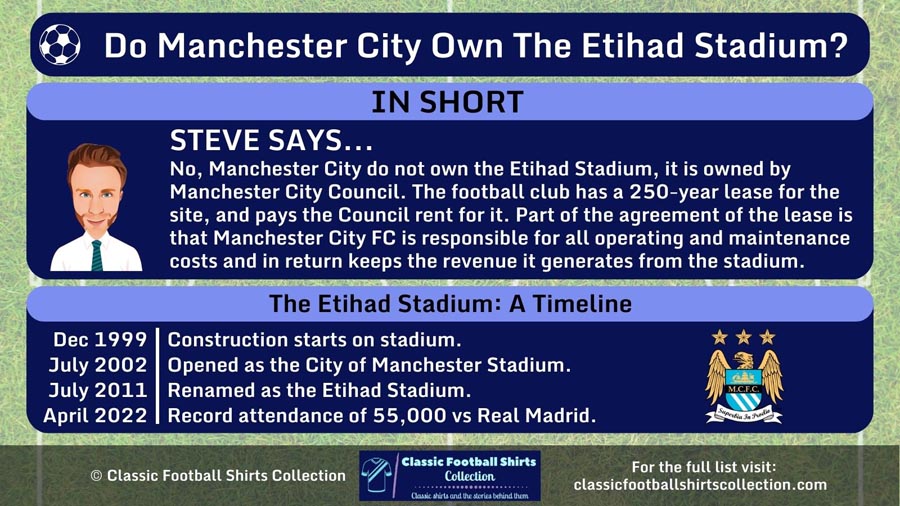
Back in 2003, Manchester City moved from its home of 80 years, Maine Road, to a new stadium.
At that time, the footballing world was very different from how it is today.
And Manchester City Football Club was a very different football club from that which it is today.
At that point in time, the new stadium was known as the City of Manchester Stadium, now it is known as the Etihad Stadium.
But do Manchester City own the Etihad Stadium?
That is what we are here to find out…
Do Manchester City Own The Etihad Stadium?
No, Manchester City do not own the Etihad Stadium, it is owned by Manchester City Council. The football club has a 250-year lease for the site, and pays the Council rent for it. Part of the agreement of the lease is that Manchester City FC is responsible for all operating and maintenance costs and in return keeps the revenue it generates from the stadium.
The City of Manchester Stadium: The Beginnings
Although it officially opened in 2002, the idea of a new stadium in Manchester was mooted as far back as 1989.
This was when the city was looking to host the 1996 Summer Olympics, which would eventually be hosted by Atlanta in the USA.
In 1993 Manchester put together another bid to host the 2000 Summer Olympics.
This time it included a plan for a new 80,000-capacity stadium on a site a mile east of the city centre, on derelict land known colloquially as Eastlands.
Manchester was again thwarted in its efforts, with Sydney chosen to host the 2000 Olympics.
Next the city submitted the planned stadium design to the Millenium Commission to be built as one of a set of stadiums constructed to mark the Millenium.
Again the bid was unsuccessful.
Undeterred, the city submitted the same site, albeit with slightly downsized plans, to host the 2002 Commonwealth Games.
This time the bid was successful and Manchester would host the 2002 Commonwealth Games.
From Athletics to Football
Construction on the stadium began in December 1999, and the project would cost £112million to build with £77million of this being provided by Sport England and the remainder by Manchester City Council.
The 2002 Commonwealth Games would be a great success, and were (and still are at the time of writing) the largest Commonwealth Games in history in terms of competing nations.
Sport England was wary of the stadium becoming a white elephant, and being only used sporadically after the Commonwealth Games.
So they insisted that the stadium be converted from a track and field arena to a football stadium, to ensure its long-term viability.
A deal was reached that saw the City Council and Manchester City FC jointly fund the £42million conversion.
The Council bankrolled £22million of the costs and the football club £20million.
Manchester City Moves In
Manchester City moved from Maine Road to the City of Manchester Stadium (CoMS), for the start of the 2003/04 season.
The football club signed a 250-year lease for the stadium from Manchester City Council which owns it.
The club leased the stadium on a ‘fully repairing’ basis. That means they are responsible for all operating and maintenance costs and receive the revenue they generate from the stadium.
However the Council remains the owner of it.
Also part of the initial terms of the rent agreement, was that Manchester City would pay the council a proportion of any ticket income above Maine Road’s 32,000 capacity.
This was thought to produce around £2million each year for the Council.
Part of this original tenancy agreement was that the Council would retain naming rights to the stadium.
But in October 2010, the terms were re-negotiated and Manchester City FC effectively gained control of the stadium naming rights for an increase in the rent.
Although it wasn’t publicly revealed Sir Howard Bernstein, the Council’s Chief Executive, did disclose that the rent Manchester City paid had increased to around £4million a year.
From City of Manchester Stadium to the Etihad Stadium
Following the renegotiation of the tenancy agreement, the CoMS was renamed the Etihad Stadium, as part of a lucrative deal with Etihad Airways.
The ten-year deal gave Etihad the naming rights to the stadium and a series of other football-related facilities that were set to be developed by Manchester City over the next decade.
The financial details of the deal were kept private, but there were suggestions the airline had paid anything up to £400million for the decade-long sponsorship deal.
CoMS Firsts
- First game: 10 August 2003 vs Barcelona (friendly).
- First goal: 10 August 2003, Nicolas Anelka.
- First competitive game: 14 August 2003 vs The New Saints (UEFA Cup).
- First competitive goal: 14 August 2003, Trevor Sinclair.
- First league game: 23 August 2003 vs Portsmouth.
- First league goal: 23 August 2003, Yakubu
Final Thoughts

The Etihad Stadium (originally known as the City of Manchester Stadium), remains owned by Manchester City Council, Manchester City FC is just a tenant at the stadium.
The club has a 250-year lease, part of which is the agreement that they are responsible for all ongoing costs associated with the stadium and in return the club receives revenue generated from ticket sales.
They also pay rent to the Council, and this is estimated to be something in the region of £4million a year.
The agreement looks to have been a profitable one for both the Council and the Football Club.
